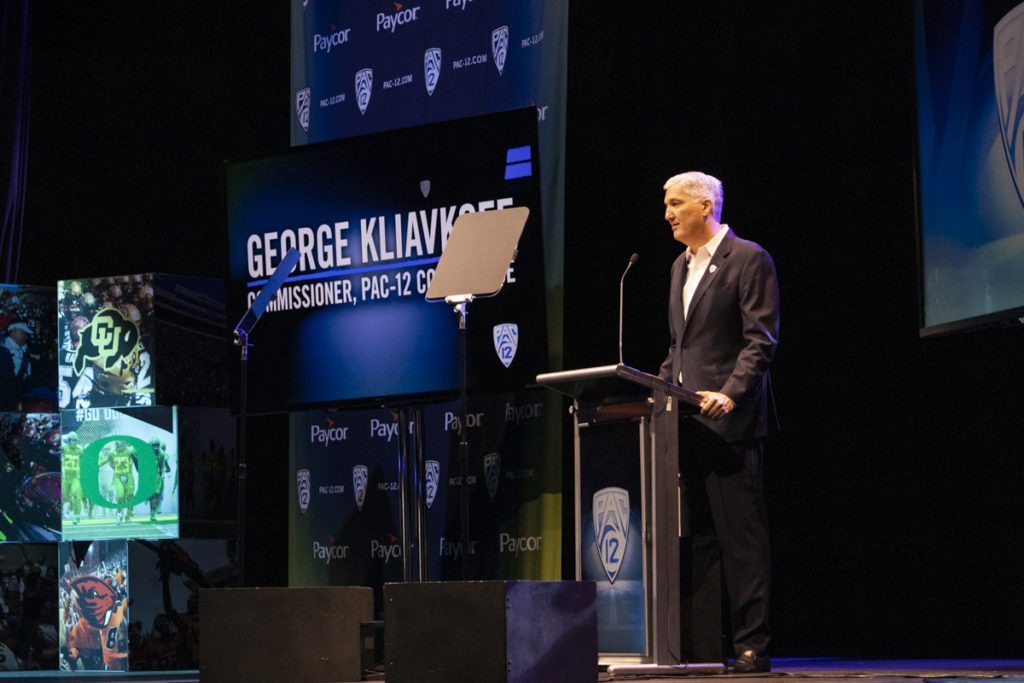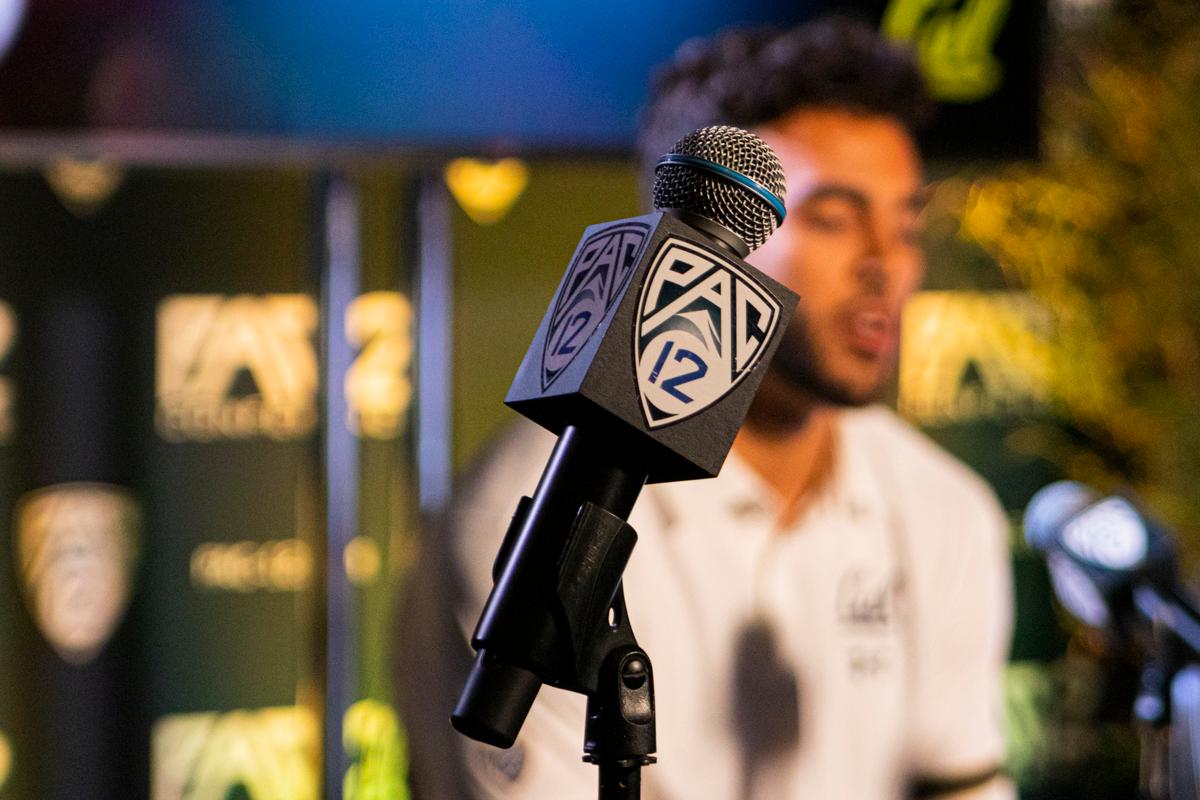Will they or won’t they? UC Board of Regents to decide on UCLA’s move to Big Ten
Pictured is a microphone with the Pac-12 logo. (Jon Christon/Daily Bruin senior staff)
By Jon Christon
Dec. 13, 2022 5:26 p.m.
To block or not to block – that is the question facing UCLA’s governing body Wednesday.
The University of California Board of Regents will meet Wednesday to finalize a decision on the school’s move to the Big Ten. In the special meeting, the regents will vote on whether or not they will allow UCLA to make the move in 2024 or force the program to stay in the Pac-12.
The special meeting was planned after no consensus was reached on the matter in a regular assembly Nov. 17.
“This additional time will allow the Board to fully consider the information presented today and address any additional questions that arise,” the regents said in a statement Nov. 17. “It will also allow the Office of the President to make specific recommendations on how the university will better support and enhance the student-athlete experience.”
UCLA, along with crosstown rival USC, shocked the sports world when it announced its departure from the Pac-12 on June 30. From there, the Bruins have been the center of rampant discussion both locally and nationally.
Gov. Gavin Newsom publicly demanded an explanation for the move in July, and the regents have now discussed the matter at four separate meetings.
In September, the regents’ general counsel Charles Robinson said the board had the legal authority to block the move if they so choose.
The only question is whether the regents would opt for such a drastic measure.

Why the regents will block the move
As stated above, the regents do have the authority to make this decision.
And they certainly have plenty of reasons why they would.
Money, of course, is why UCLA chose to ditch the Pac-12 in the first place, so let’s start there.
[Related: Christon Chronicles: Big Ten membership may not mitigate all of UCLA Athletics’ financial challenges]
It was conventional thinking back in July that the move would net UCLA a windfall of cash that it could not turn down, given the athletic department is $102.8 million in debt. Now, that doesn’t appear to be the case.
The Pac-12 reportedly offered the regents a glimpse into its media rights negotiations earlier in the year, saying that with UCLA in the fold, member schools would net somewhere in the range of $42 to $47 million with the conference’s eventual media rights deal. That price point has possibly decreased after the Big 12 signed a smaller-than-expected deal in October, but it shouldn’t be too far off.
According to the New York Times, the Pac-12 would also be willing to give UCLA a larger share than the rest of the remaining 10 member schools and would pay the Big Ten the $15 million buyout that UCLA would owe the conference for breaking its previous agreement.
UCLA’s agreement with the Big Ten reportedly nets the school in the range of $65 million on an annual basis, with some projections going as high as $75 million. However, UCLA chancellor Gene Block told the regents that the move would cost $10 million per year in added expenses through increased travel and academic and mental health support.
The regents could also force UCLA to pay a subsidy to California if it moved conferences, further clouding any fiscal discussions.
In other words, the financial aspect isn’t quite as drastic as once believed – and it could even be negligible in the long term.
With that in mind, the regents can look at other reasons why they think UCLA would be better off staying where it is.
[Related: Joseph’s Diagnosis: UCLA’s move to Big Ten fails to truly consider student-athletes, fans]
Many groups and individuals have urged the regents to keep UCLA in the Pac-12, including the National College Players Association. In a letter sent to the regents Dec. 7, the union advocacy group called the move a “short-sighted cash grab.”
Ramogi Huma, a former linebacker for UCLA football and current executive director of the NCPA, pointed to academic and mental health concerns that would disproportionately affect Black students.
Pac-12 commissioner George Kliavkoff similarly penned a letter in September, and, in addition to the concerns of student-athlete well-being, said UCLA’s move would negatively impact the UC’s pledge to curtail climate change because of the increased travel.
Finally, California state senator Nancy Skinner has said she is thinking of penning a bill that would limit the amount of time student-athletes could spend in their sports, which would include travel time.
While it’s still considered unlikely, the regents’ blocking of UCLA’s move wouldn’t be without merit – or without supporters.
Why the regents won’t block the move
While technically the regents have the authority to block the move, such a decision would be unprecedented.
The regents granted decision-making authority to university chancellors in the 1990s, though they never fully relinquished its power. While a move directly overruling a member school would technically be allowed, it would undercut the autonomy of the UC’s 10 campuses and could set an unwanted precedent for future decisions.
A decision would also leave UCLA and its athletic director Martin Jarmond in a state of untenable limbo. Jarmond is not the most popular man in the Pac-12 at the moment, to say the least, and it would make for some awkward interactions in future dealings should he be forced to stay in the conference he chose to leave.
Potential repercussions, though, go beyond UCLA. The Big Ten would likely seek a replacement team in UCLA’s place to fulfill its new media rights agreement, and the conference could look to the Pac-12 – Oregon, Washington or Stanford seem like logical choices – to recoup some media value, leaving the Bruins in the lurch in a falling conference.
A middle ground
However, there is an option between doing nothing and making a radical statement.
As mentioned before, UCLA could be forced to subsidize Cal’s athletic department with its earnings from the Big Ten. The Golden Bears are similarly in a tough spot financially, and it could get even worse with UCLA leaving and lowering the Pac-12’s media rights value.
UCLA will not take any decision laying down – especially if further conference realignment leaves the school in the dust – and the regents will likely want to avoid any of that headache. As such, a moderate decision will always be more likely than anything drastic.
The regents have repeatedly deferred the past five and a half months.
Now it is decision time.
